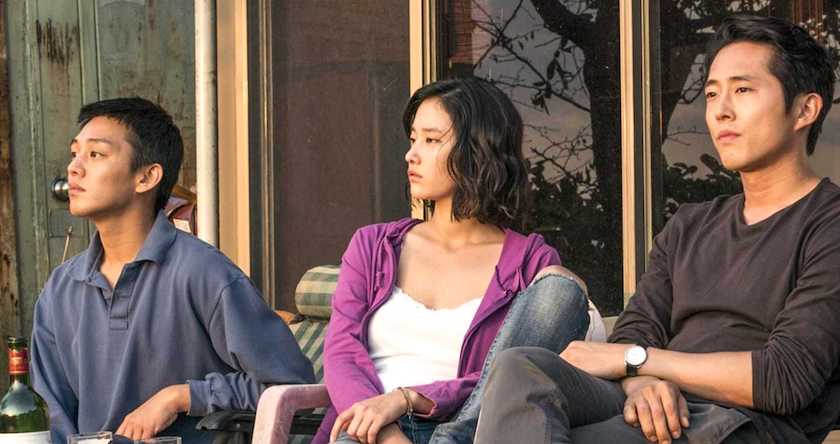
[This is a repost of our 2019 review]
Burning is the sixth movie from Korean director Lee Chang-dong (Poetry, Secret Sunshine). It’s based on the short story Barn Burning by renowned Japanese author Haruki Murakami and taken from his short fiction collection, The Elephant Vanishes.
While out in the city one afternoon, Lee Jong-su (Yoo Ah-in) bumps into childhood friend Shin Hae-mi (Jun Jong-seo) and the two quickly re-connect. When Hae-mi announces she will be travelling to Africa for several weeks, she asks him to look after her cat, Boil. When Hae-mi arrives home, Jong-su goes to pick her up from the airport, only to find she has met someone while travelling – the rich and sophisticated Ben (Steven Yeun). The exact nature of their relationship is not immediately clear to Jong-su and so the three hang out together and gradually become friendly in what initially seems to be a strange love / friendship triangle.
Burning is one of those movies where if you know too much going in, your enjoyment will be sorely diminished. So it’s advisable to avoid the trailers because there is lot to unpack in terms of plot and these characters that will no doubt generate much post-movie discussion.
Burning transplants Murakami’s tale from Tokyo to Seoul and uses it more for inspiration than literal adaptation. The story, Barn Burning, runs to a slim 18 pages, yet Lee Chang-dong has wrested a hefty two and a half hours out of the source material. Murakami’s story is the foundation for the first half of the film, while the second half is as if Lee Chang-dong has finished his thought – extrapolating Murakami’s ideas into a film that is very much his own work. However, much of the dialogue and some pivotal scenes from the story remain intact. Those familiar with Murakami’s tale will enjoy the contrast in storytelling between his very matter-of-fact prose and Lee Chang-dong’s slow and deliberate filmmaking.
Considering the run time, it’s probably stating the obvious to report that Burning is a very slow movie. It takes its sweet time getting to where it wants to go, and there are times where it feels a bit ponderous. You might even walk out wondering what all the fuss is about. But Burning is going to stick in your brain and ping around your grey matter like a marble until you realise this methodical approach is absolutely necessary. It’s necessary because it ensures we understand precisely who these people are, and as the audience experiences the film entirely from Jong-su’s perspective, understanding these characters compensates for the fact we do not have a complete understanding of events. It allows us to make the same assumptions and deductions as Jong-su, as the plot unfolds.
In Murakami’s original story, the Hae-mi character is only ever referred to as ‘her’, and the Ben character is only known as ‘the guy’ for reasons that are never quite clear. It’s an odd choice as it depersonalises the characters but also leaves the reader in no doubt that this is the narrator’s story. Lee Chang-dong takes the opposite approach with his film, in not only naming these people, but spending a long time getting to know them. It pays dividends and ties in to what really holds Burning together ““ the trio of central performances.
Starting with Yoo Ahi-in as Lee Jong-su, a wide-eyed kid, initially confident but thereafter mooning after Hae-mi. Walking around with his mouth wide open as if seeing everything for the first time, his face completely unable to hide what his brain is thinking. Later this superficial innocence works in his favour as he gets down to some serious detective work – throwing his important questions casually into the mix like a young Columbo.
Jun Jong-seo is excellent in her debut performance. It’s hard to believe this is her first role as she brings a charm and magnetism to Hae-mi that makes it easy to see why both Jong-su and Ben want to be around her. Even later on, when Ben and his rich friends mock her, or when Jong-su childishly insults her, her natural spark can’t be extinguished. Having travelled to Africa, she talks of ‘Great Hunger’, in reference to those who seek a deeper meaning from existence, and Hae-mi embodies this spirit completely.
Steven Yeun, best known as Glenn in The Walking Dead, is superb as Ben. He is rich and his wealth is of unknown means. When Jong-su asks him what he does for a living, Ben states, simply, that he ‘plays’. It’s particularly hard to stomach for Jong-su, coming from a poor working-class community, to see a young person not much older than himself commanding such wealth that he apparently did not have to work for. We share Jong-su’s dislike of Ben because, frankly, he’s a dick. At the same time, it’s easy to see why Hae-mi falls so easily for his charms, as he’s exudes superficial confidence and sophistication.
Burning is also a film of contrast. Subtle and ambiguous until at once, like a switch being flipped, it is not. The three friends are also contrasting opposites, from their socio-economic backgrounds to their personalities. Jong-su is naïve and from a working class family. Hae-mi too, is from a working class background, but exuberant and charming and full of ‘Great Hunger’. While Ben is rich and cultured, but blighted by the smug and coddled overconfidence of the wealthy.
While Burning‘s pacing and run time might be off putting to some, it is a film very much worth sticking with, as it subverts expectation. Burning starts as one thing, and morphs into something quite different. The power of these characters to hold your interest and the subtle way this mystery unfolds means Burning not only demands your rapt attention in the theatre, but also afterwards as it gets inside your head and refuses to budge.

Join Screen Realm on Twitter, Facebook, Instagram, LinkedIn and YouTube.








